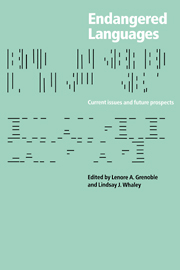Book contents
- Frontmatter
- Contents
- Preface
- List of abbreviations and symbols
- Part I General issues
- 1 Western language ideologies and small-language prospects
- 2 Toward a typology of language endangerment
- Part II Language-community responses
- Part III What is lost: language diversity
- Part IV Mechanisms of language loss
- Appendix
- References
- Index of languages
- Index of names
- General index
1 - Western language ideologies and small-language prospects
Published online by Cambridge University Press: 05 June 2012
- Frontmatter
- Contents
- Preface
- List of abbreviations and symbols
- Part I General issues
- 1 Western language ideologies and small-language prospects
- 2 Toward a typology of language endangerment
- Part II Language-community responses
- Part III What is lost: language diversity
- Part IV Mechanisms of language loss
- Appendix
- References
- Index of languages
- Index of names
- General index
Summary
It might be said with a certain metaphoric license that languages are seldom admired to death but are frequently despised to death. That is, it's relatively rare for a language to become so exclusively tied to prestigious persons and high-prestige behaviors that ordinary people become too much in awe of it to use it or are prevented by language custodians from doing so. By contrast, it's fairly common for a language to become so exclusively associated with low-prestige people and their socially disfavored identities that its own potential speakers prefer to distance themselves from it and adopt some other language. Parents in these circumstances will make a conscious or unconscious decision not to transmit the ancestral language to their children, and yet another language will be lost. The power of the social forces involved is evidently considerable, since under better circumstances attachment to an ancestral mother tongue is usually strong. The phenomenon of ancestral-language abandonment is worth looking at, then, precisely because a good many people, especially those who speak unthreatened languages, are likely to have trouble imagining that they themselves could ever be brought to the point of giving up on their own ancestral language and encouraging their children to use some other language instead.
Unless they become fossilized so that they persist in specialized uses without ordinary speakers, as sometimes happens in connection with religious practices (Latin, Sanskrit, Coptic Egyptian, Ge'ez, etc.), languages have the standing that their speakers have.
- Type
- Chapter
- Information
- Endangered LanguagesLanguage Loss and Community Response, pp. 3 - 21Publisher: Cambridge University PressPrint publication year: 1998
- 99
- Cited by

